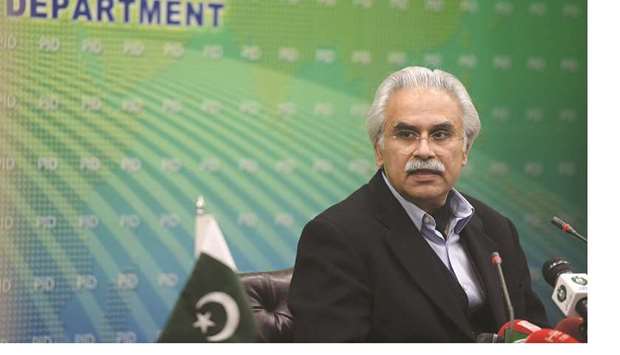Special Assistant to Prime Minister Imran Khan on Health Dr Zafar Mirza said yesterday that the government now has a plan to deal with the situation of pilgrims coming to Pakistan from Iran, which has been hit with the coronavirus epidemic.
He has reviewed the situation at the Taftan-Zahedan border.
During his visit, the health minister said that over next few days the authorities will gradually allow Pakistani “zaireens” or pilgrims returning from Iran to enter the country, after full health screening.
He further said that the point of entry is being strengthened.
Meanwhile, Pakistan has suspended all flights to Iran and closed land borders with its neighbour, officials confirmed yesterday, after Islamabad detected its first two coronavirus cases, both people who had recently travelled to the Islamic Republic.
Flights to and from China, the epicentre of the deadly outbreak, and Afghanistan, which also detected its first case this week, were still operating, however, and their land borders with Pakistan were also open.
“Aviation Divison has decided to cease all direct flights between Pakistan and Iran,” civil aviation authority spokesman Abdul Sattar Khokhar said.
No Pakistani airlines were operating between the two countries, meaning the move hits three Iranian carriers – Iran Air, Mahan Air and Taban Air.
The virus has now killed at least 2,856 and infected more than 83,000 worldwide, with an increasing number of new cases being reported each day.
New infections have slowed in China, which has nearly 2,800 deaths out of nearly 79,000 cases.
However, Iran has emerged as a new hotspot for the virus, with at least 26 deaths and more than 245 infections so far.
There are growing fears in Pakistan – sandwiched between China and Iran – over how the country would deal with the outbreak.
Pakistan’s two cases were detected in the capital Islamabad, and in the teeming port megacity of Karachi.
Mirza said that the two patients were stable and their condition was improving.
“Contacts traced until now and tested are all negative,” he added.
Separately, the Sindh health department cleared the family of Pakistan’s first confirmed coronavirus patient after screening.
The 22-year-old had arrived in Karachi on February 20, indicating that there were chances that the thermal screening machines at the airports for those entering the country may not have worked after all.
The machines are supposed to immediately detect higher-than-usual body temperature.
In Islamabad, doctors at the city’s largest public hospital revealed to AFP that they had not been provided with masks or any other protective equipment to treat suspected patients.
While in Karachi, officials said they were scrambling to screen at least 1,500 people who had recently returned from Iran.
The cost of surgical masks was shooting up in the city’s markets, and with schools closed and some people staying inside, its notorious traffic had eased.
Authorities this week also moved to quarantine at least 270 people in Baluchistan, near the Iranian border, after a group of pilgrims returned and briefly mixed with other residents.
“We have set-up an 80-tent quarantine facility at Taftan border, we will bring back Pakistanis in Iran in batches,” said Najeebullah Qambrani, a local official in the town which is one of the main crossings to Iran.
Yesterday schools remained closed in Sindh and Baluchistan.

Mirza: has reviewed the situation at the Taftan-Zahedan border.
